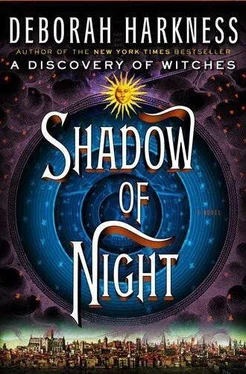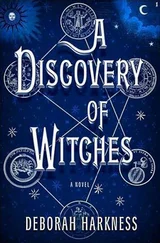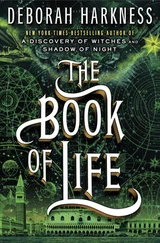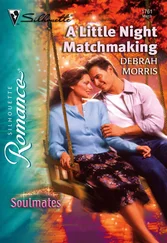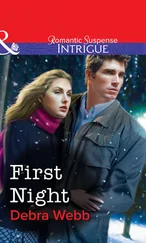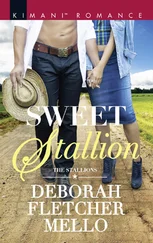“That sounds like a festive start to the New Year.” Matthew said, settling the cloak over my shoulders.
“What were you looking at?” I peered out the windows.
“Someone’s building a bonfire across the river for New Year’s Eve. Every time they send the wagon for fresh wood, the local residents filch what’s already there. The pile gets smaller by the hour. It’s like watching Penelope ply her needle.”
“Mary said no one will be working tomorrow. Oh, and to be sure to tell Françoise to buy extra manchet—that’s bread, right?—and to soak it in milk and honey to make it soft again for Saturday’s breakfast.” It was Elizabethan French toast in all but name. “I think Mary’s worried I might go hungry in a house run by vampires.”
“Lady Pembroke has a don’t-ask, don’t-tell policy when it comes to creatures and their habits,” Matthew observed.
“She certainly never mentioned what happened to her shoes,” I said thoughtfully.
“Mary Sidney survives as her mother did: by turning a blind eye to every inconvenient truth. The women in the Dudley family have had to do so.”
“Dudley?” I frowned. That was a family of notorious troublemakers— nothing at all like the mild-mannered Mary.
“Lady Pembroke’s mother was Mary Dudley, a friend of Her Majesty and sister to the queen’s favorite, Robert.” Matthew’s mouth twisted. “She was brilliant, just like her daughter. Mary Dudley filled her head with ideas so there was no room in it for knowledge of her father’s treason, or her brothers’ missteps. When she caught smallpox from our blessed sovereign, Mary Dudley never acknowledged that both the queen and her own husband thereafter preferred the company of others rather than face her disfigurement.”
I stopped, shocked. “What happened to her?”
“She died alone and embittered, like most Dudley women before her. Her greatest triumph was marrying off her fifteen-year-old namesake to the forty-year-old Earl of Pembroke.”
“Mary Sidney was a bride at fifteen?” The shrewd, vibrant woman ran an enormous household, reared a pack of energetic children, and was devoted to her alchemical experiments, all with no apparent effort. Now I understood how. Lady Pembroke was younger than me by a few years, but by the age of thirty she’d been juggling these responsibilities for half her life.
“Yes. But Mary’s mother provided her all the tools necessary for her survival: iron discipline, a deep sense of duty, the best schooling money could buy, a love of poetry, and her passion for alchemy.”
I touched my bodice, thinking of the life growing within me. What tools would he need to survive in the world?
We talked about chemistry on our way home. Matthew explained that the crystals that Mary brooded over like a hen were oxidized iron ore and that she would later distill them in a flask to make sulfuric acid. I’d always been more interested in the symbolism of alchemy than in its practical aspects, but my afternoon with the Countess of Pembroke had shown me how intriguing the links between the two might be.
Soon we were safely inside the Hart and Crown and I was sipping a warm tisane made from mint and lemon balm. It turned out the Elizabethans did have teas, but they were all herbal. I was chattering on about Mary when I noticed Matthew’s smile.
“What’s so funny?”
“I haven’t seen you like this before,” he commented.
“Like what?”
“So animated—full of questions and reports of what you’ve been doing and all the plans you and Mary have for next week.”
“I like being a student again,” I confessed. “It was difficult at first, not to have all the answers. Over the years I’ve forgotten how much fun it is to have nothing but questions.”
“And you feel free here, in a way that you didn’t in Oxford. Secrets are a lonely business.” Matthew’s eyes were sympathetic as his fingers moved along my jaw.
“I was never lonely.”
“Yes you were. I think you still are,” he said softly.
Before I could shape a response, Matthew had me out of my seat and was backing us toward the wall by the fireplace. Pierre, who was nowhere to be seen only moments before, appeared at the threshold.
Then a knock sounded. Matthew’s shoulder muscles bunched, and a dagger flashed at his thigh. When he nodded, Pierre stepped out onto the landing and flung open the door.
“We have a message from Father Hubbard.” Two male vampires stood there, both dressed in expensive clothes that were beyond the reach of most messengers. Neither was more than fifteen. I’d never seen a teenage vampire and had always imagined there must be prohibitions against it.
“Master Roydon.” The taller of the two vampires tugged at the tip of his nose and studied Matthew with eyes the color of indigo. Those eyes moved from Matthew to me, and my skin smarted from the cold. “Mistress.” Matthew’s hand tightened on his dagger, and Pierre moved to stand more squarely between us and the door.
“Father Hubbard wants to see you,” the smaller vampire said, looking with contempt at the weapon in Matthew’s hand. “Come when the clocks toll seven.”
“Tell Hubbard I’ll be there when it’s convenient,” said Matthew with a touch of venom.
“Not just you,” the taller boy said.
“I haven’t seen Kit,” Matthew said with a touch of impatience. “If he’s in trouble, your master has a better idea where to look for him than I do, Corner.” It was an apt name for the boy. His adolescent frame was all angles and points.
“Marlowe’s been with Father Hubbard all day.” Corner’s tone dripped with boredom.
“Has he?” Matthew said, eyes sharp.
“Yes. Father Hubbard wants the witch,” Corner’s companion said.
“I see.” Matthew’s voice went flat. There was a blur of black and silver, and his polished dagger was quivering, point first, in the doorjamb near Corner’s eye. Matthew strolled in their direction. Both vampires took an involuntary step back. “Thank you for the message, Leonard.” He nudged the door closed with his foot.
Pierre and Matthew exchanged a long, silent look while adolescent vampire feet racketed down the stairs.
“Hancock and Gallowglass,” ordered Matthew.
“At once.” Pierre whirled out of the room, narrowly avoiding Françoise. She pulled the dagger from the doorframe.
“We had visitors,” Matthew explained before she could complain about the state of the woodwork.
“What is this about, Matthew?” I asked.
“You and I are going to meet an old friend.” His voice remained ominously even.
I eyed the dagger, which was now lying on the table. “Is this old friend a vampire?”
“Wine, Françoise.” Matthew grabbed at a few sheets of paper, disordering my carefully arranged piles. I muffled a protest as he picked up one of my quills and wrote with furious speed. He hadn’t looked at me since the knock on the door.
“There is fresh blood from the butcher. Perhaps you should . . .”
Matthew looked up, his mouth compressed into a thin line. Françoise poured him a large goblet of wine without further protest. When she was finished, he handed her two letters.
“Take this to the Earl of Northumberland at Russell House. The other goes to Raleigh. He’ll be at Whitehall.” Françoise went immediately, and Matthew strode to the window, staring up the street. His hair was tangled in his high linen collar, and I had a sudden urge to put it to rights for him. But the set of his shoulders warned me that he wouldn’t welcome such a proprietary gesture.
“Father Hubbard?” I reminded him. But Matthew’s mind was elsewhere.
“You’re going to get yourself killed,” he said roughly, his back still turned. “Ysabeau warned me you have no instinct for self-preservation. How many times does something like this have to happen before you develop one?”
Читать дальше
